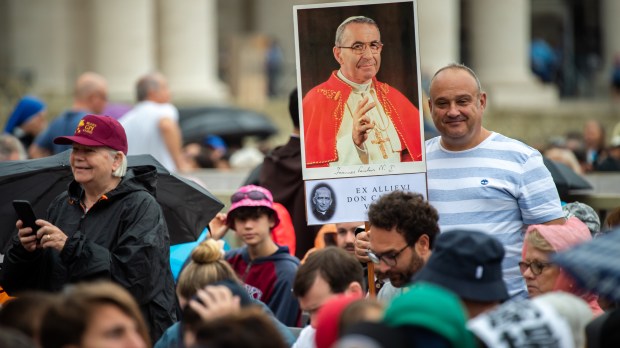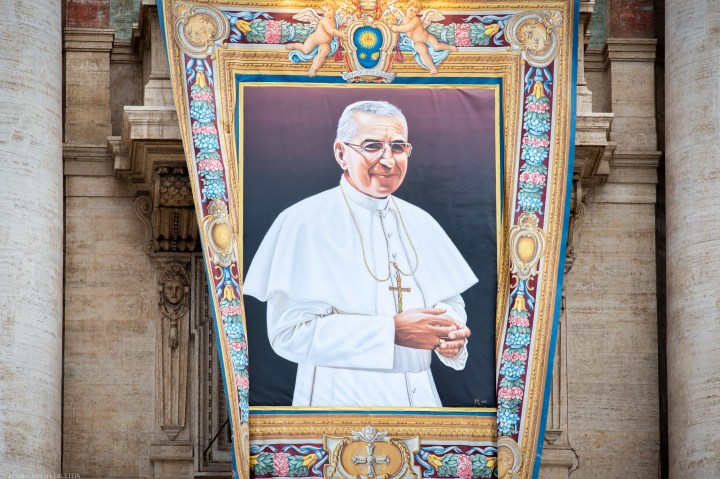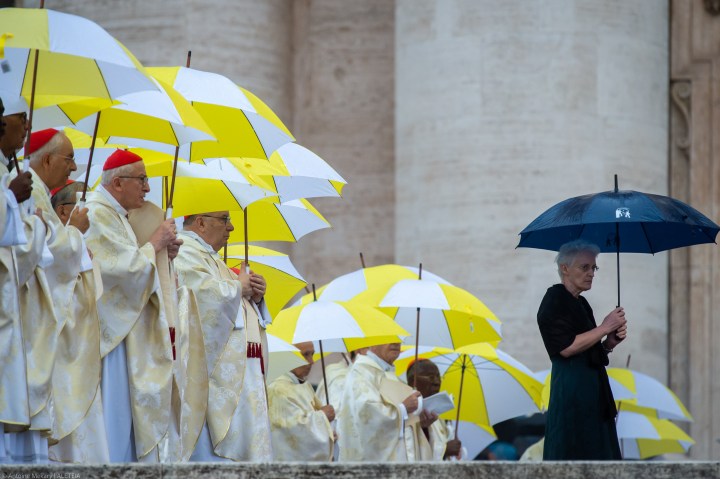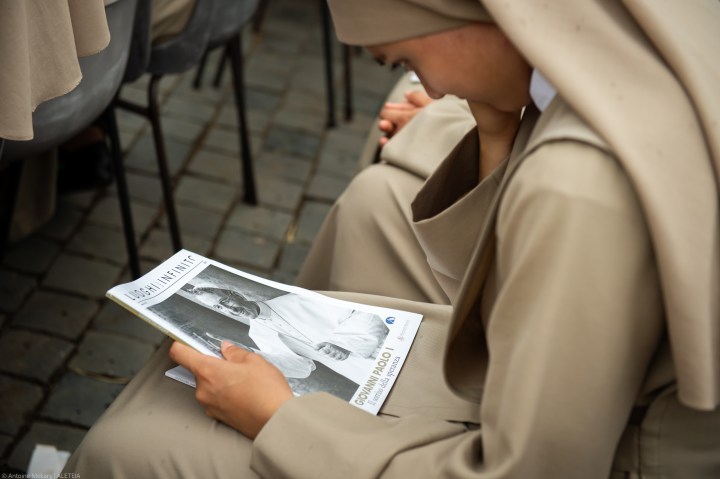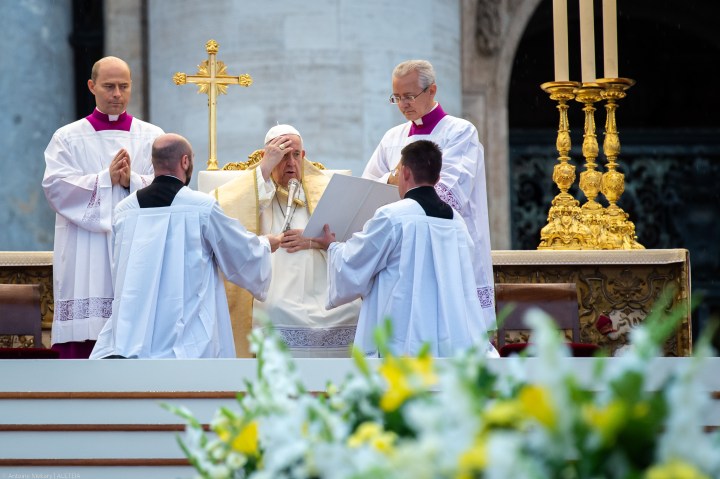To love even at the cost of sacrifice, silence, misunderstanding, solitude, resistance and persecution. To love in this way, even at this price, because, as Blessed John Paul I also said, if you want to kiss Jesus crucified, “you cannot help bending over the cross and letting yourself be pricked by a few thorns of the crown on the Lord’s head” (General Audience, 27 September 1978).
This was the invitation Pope Francis made on September 4, 2022, at the Mass in which he beatified his predecessor, Pope John Paul I.
Albino Luciani (John Paul I) was elected to the See of Peter at the death of Paul VI on August 26, 1978. Though he was only 65 years old, he had a heart attack less than a month later and died on September 28 of that year. Pope John Paul II was elected to succeed him.
Here is a Vatican translation of Pope Francis’ homily:
~
Jesus is making his way to Jerusalem, and today’s Gospel tells us that “large crowds were travelling with him” (Lk 24:25). To travel with Jesus means to follow him, to become his disciples. Yet, the Lord’s message to those people was not exactly appealing; in fact, it was quite demanding: whoever does not love him more than his or her own family, whoever does not carry the cross, whoever remains attached to earthly goods, cannot be his disciple (cf. vv. 26-27.33). Why does Jesus say these things to the crowds? What do these admonitions mean? Let us try to answer these questions.
First, we see a great crowd of people following Jesus. We can imagine that many were attracted by his words, astonished at the things he did, and saw him as a source of hope for the future. What would any teacher of that time or, for that matter, what would any astute leader do, seeing that his or her words and charisma attract crowds and increase his or her popularity? The same thing happens today, at times of personal or societal crisis, when we are especially prey to feelings of anger or we fear things that threaten our future. We become more susceptible and thus, on the tide of emotion, we look to those who can shrewdly take advantage of the situation, profiting from society’s fears and promising to be the “saviour” who can solve all its problems, whereas in reality they are looking for wider approval and for greater power, based on the impression they make, their ability to have things in hand.
The Gospel tells us that this is not Jesus’ way. God’s style is different. It is important to understand God’s style, how he acts. God acts according to a style, and God’s style is different from that of certain people, since he does not exploit our needs or use our vulnerability for his own aggrandizement. He does not want to seduce us with deceptive promises or to distribute cheap favours; he is not interested in huge crowds. He is not obsessed with numbers; he does not seek approval; he does not idolize personal success. On the contrary, he seems to be worried when people follow him with giddy excitement and enthusiasm. As a result, instead of yielding to the allure of popularity – for popularity is alluring – he asks each person to discern carefully their reason for following him and the consequences that it will entail. For many in those crowds might have been following Jesus because they hoped he would be a leader who could set them free from their enemies, someone who, once in power, could share that power with them, or someone who by performing miracles could make hunger and disease disappear. We can follow the Lord for any number of reasons. Some of these, it must be acknowledged, are worldly. A perfect religious exterior can serve to hide the mere satisfaction of one’s own needs, the quest of personal prestige, the desire for a certain social status or to keep things under control, the thirst for power and privilege, the desire for recognition and so on. This happens even nowadays among Christians. Yet that is not the style of Jesus. That cannot be the style of his disciples and of his Church. If anyone follows Jesus with this kind of self-interest, he or she has taken the wrong path.
The Lord demands a different attitude. To follow him does not mean to become part of a court or a triumphal procession, or even to receive a lifetime insurance policy. On the contrary, it means “carrying one’s cross” (Lk 14:27): shouldering, like him, one’s own burdens and those of others, making one’s life a gift, not a possession, spending it in imitation of his own generous and merciful love for us. These are decisions that engage the totality of our lives. For this reason, Jesus desires that his disciples prefer nothing to this love, even their deepest affections and greatest treasures.
To do this, we need to look to him more than to ourselves, to learn how to love, and to learn this from the Crucified One. In him, we see the love that bestows itself to the very end, without measure and without limits. The measure of love is to love without measure. In the words of Pope John Paul, “we are the objects of undying love on the part of God” (Angelus, 10 September 1978). An undying love: it never sinks beneath the horizon of our lives; it shines upon us and illumines even our darkest nights. When we gaze upon the Crucified Lord, we are called to the heights of that love, to be purified of our distorted ideas of God and of our self-absorption, and to love God and others, in Church and society, including those who do not see things as we do, to love even our enemies.
To love even at the cost of sacrifice, silence, misunderstanding, solitude, resistance and persecution. To love in this way, even at this price, because, as Blessed John Paul I also said, if you want to kiss Jesus crucified, “you cannot help bending over the cross and letting yourself be pricked by a few thorns of the crown on the Lord’s head” (General Audience, 27 September 1978). A love that perseveres to the end, thorns and all: no leaving things half done, no cutting corners, no fleeing difficulties. If we fail to aim high, if we refuse to take risks, if we content ourselves with a watered-down faith, we are, as Jesus says, like those who want to build a tower but do not estimate the cost; they “lay the foundations”, but then are “not able to finish the work” (v. 29). If the fear of losing ourselves makes us stop giving ourselves, we leave things undone: our relationships and work, our responsibilities and commitments, our dreams and even our faith. And then we end up living life halfway – and how many people live life halfway, and we also frequently are tempted to live life halfway – without ever taking the decisive step – this is what it means to live life halfway – without ever taking flight, without ever taking risks for the good, and without ever truly committing ourselves to helping others. Jesus asks us precisely this: live the Gospel and you will live your life, not halfway but to the full. Live the Gospel, live life, with no compromises.
Dear brothers and sisters, our new Blessed lived that way: in the joy of the Gospel, without compromises, loving to the very end. He embodied the poverty of the disciple, which is not only detachment from material goods, but also victory over the temptation to put oneself at the centre, to seek one’s own glory. On the contrary, following the example of Jesus, he was a meek and humble pastor. He thought of himself as dust on which God deigned to write (cf. A. LUCIANI/JOHN PAUL I, Opera Omnia, Padua, 1988, vol. II, 11). That is why he could say: “The Lord recommended it so much: be humble. Even if you have done great things, say: ‘We are useless servants’” (General Audience, 6 September 1978).
With a smile, Pope John Paul managed to communicate the goodness of the Lord. How beautiful is a Church with a happy, serene and smiling face, a Church that never closes doors, never hardens hearts, never complains or harbours resentment, does not grow angry or impatient, does not look dour or suffer nostalgia for the past, falling into an attitude of going backwards. Let us pray to him, our father and our brother, and ask him to obtain for us “the smile of the soul”, a transparent smile that does not deceive, the smile of the soul. Let us pray, in his own words: “Lord take me as I am, with my defects, with my shortcomings, but make me become what you want me to be” (General Audience, 13 September 1978). Amen
